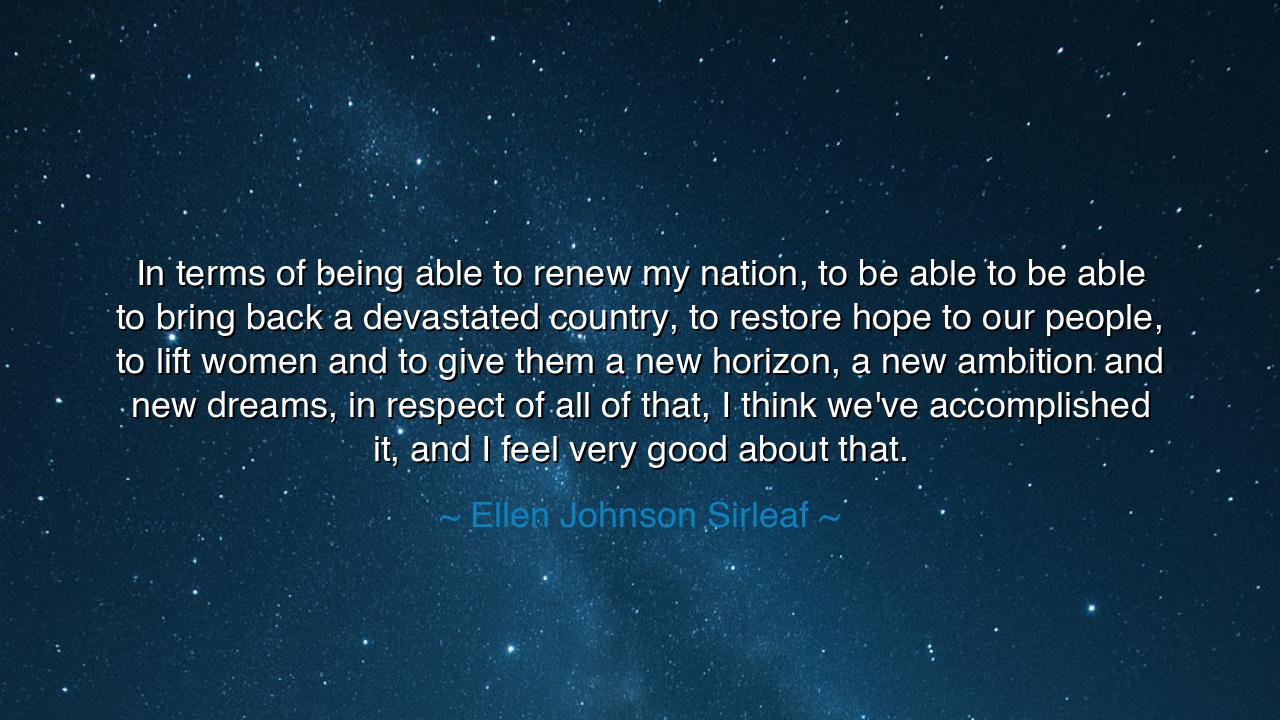
In terms of being able to renew my nation, to be able to be able
In terms of being able to renew my nation, to be able to be able to bring back a devastated country, to restore hope to our people, to lift women and to give them a new horizon, a new ambition and new dreams, in respect of all of that, I think we've accomplished it, and I feel very good about that.






The words of Ellen Johnson Sirleaf, the first female president of Liberia and the first woman ever elected head of state in Africa, resound with the power of both triumph and humility: “In terms of being able to renew my nation, to be able to bring back a devastated country, to restore hope to our people, to lift women and to give them a new horizon, a new ambition and new dreams—in respect of all of that, I think we’ve accomplished it, and I feel very good about that.” This is not the voice of pride, but of purpose fulfilled; not the boast of a ruler, but the quiet reflection of a healer of nations. Her words are the echo of a people who have walked through fire and emerged with light in their hands.
In these lines, Sirleaf speaks not of political victories or material gains, but of something more enduring: renewal, restoration, and the rebirth of hope. Her nation, Liberia, had been shattered by years of civil war—its cities burned, its children orphaned, its women violated, its people divided. To rebuild such a country is not merely to lay new roads or raise new walls; it is to mend the spirit of a people. Her statement, then, is the testament of a leader who understood that the true wealth of a nation is not found in its resources but in its people’s courage to dream again.
When she speaks of being able “to lift women,” her words carry the weight of centuries. For in many lands, and especially in her own, women bore the burdens of war without the rewards of peace. They were the ones who gathered the remains of what was broken, who kept families alive, who held the memory of humanity in the darkest of hours. To lift women is not merely to elevate one group; it is to awaken the strength of the nation itself. For when a woman rises, the generations she nurtures rise with her. Sirleaf’s leadership was not only political—it was symbolic, a living declaration that the future belongs equally to the daughters as to the sons.
Her achievement recalls the story of Ashoka the Great, the ancient emperor of India, who once ruled through conquest but later turned to peace after seeing the suffering of his own people. Ashoka realized that rebuilding hearts was greater than building empires. In the same way, Ellen Johnson Sirleaf turned from the ruins of war to the work of compassion. Her “empire” was not one of territory, but of restored dignity, education, and faith. She did not conquer with swords, but with vision—a vision that women could lead, that nations could heal, that hope could live again in soil watered by tears.
To restore hope, as she did, is among the most sacred tasks of leadership. Hope cannot be legislated; it must be lived. It grows not from commands, but from example—from the courage to endure, the willingness to forgive, and the steadfast belief that one’s country, however broken, can rise again. Sirleaf’s words remind us that renewal begins not with wealth or might, but with belief—the same belief that breathes life into ashes, that turns wounds into wisdom, that transforms despair into purpose.
But let us not mistake her calm confidence for ease. The work she describes—“to renew my nation”—is the work of lifetimes. To bring back a devastated country is to face opposition, to withstand betrayal, and to keep walking when the path is uncertain. Yet she speaks not with bitterness, but with peace. Why? Because she has witnessed the fruit of perseverance. She has seen children return to school, communities rebuild their lives, and women once silenced now stand as leaders. To accomplish such a renewal is to partake in the divine—to serve as an instrument through which a nation remembers its soul.
And so, my child, let this teaching take root within you: to lift others is the highest calling, and to restore hope where there is none is the noblest victory. You may not rebuild nations as Sirleaf did, but you can rebuild hearts. In your family, in your work, in your community—seek to renew what is weary, to uplift what is fallen, to inspire what has lost faith. Begin with kindness, continue with courage, and end with gratitude. For every act of compassion, however small, is a thread in the great tapestry of renewal that she began.
Thus, Ellen Johnson Sirleaf’s words stand as both legacy and lesson: that true leadership is not domination, but resurrection. To renew one’s nation, to awaken its dreams, to lift its people—this is the work of one who serves the higher good. May we all, in our own small realms, learn to push back the darkness as she did, and to say at life’s end, as she said of hers: “We have restored hope, and I feel very good about that.”






AAdministratorAdministrator
Welcome, honored guests. Please leave a comment, we will respond soon